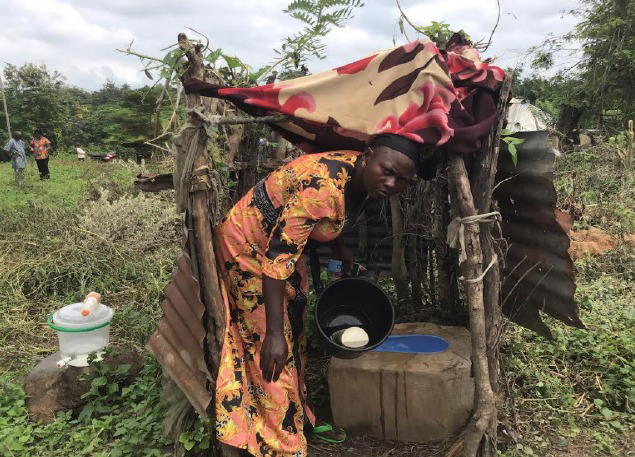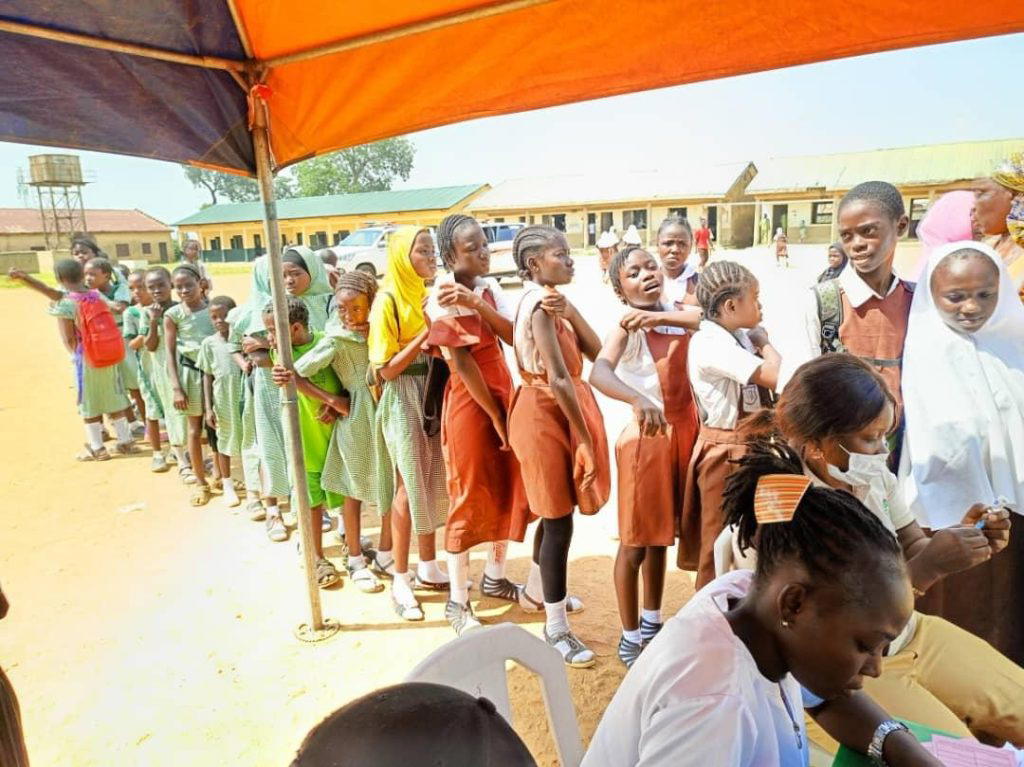• As improved hygiene & sanitation solutions rise to the rescue
By Chioma Obinna
For some privileged Nigerians, access to toilet facilities is not a big deal. But for millions of Nigerians, toilet access is a luxury. For these Nigerians, each time nature calls, it comes with fear spanning from being attacked or exposed to dangerous animals or snakes or diseases.

Today, these fears are real, particularly, for women and girls who are daily exposed to sexual assaults in the bush.
Water Sanitation and Hygiene facilities undoubtedly, are about the basic dignity and safety of women and girls.
The burden of open defecation is widespread in Nigeria with statistics showing that 48 million people are defecating in the open. Many communities do not have decent toilets and residents including women use the bush.
Apart from being raped, girls, most times miss classes when they are on their monthly period because their schools lack decent private toilets.
Snakebite in the bush
Adeola, 18, was bitten by a snake in the bush. In her community, most households do not have toilets and there are no public toilets in the community.
“Defecating in the bush is not a good experience. Sometimes, you are scared of going into the bush alone as a woman. I was bitten by a snake sometime ago,” Adeola lamented.
She recalled that she was about to squat to defecate when the snake bit her. “We usually go very early in the morning and later at night and when we cannot hold it in the afternoon we also go to the bush,” she explained.
Like Adeola, stories abound about Nigerian girls who have been attacked and violated sexually. Many of them have been exposed to different diseases or killed in the process.
For Grace, the problem is huge. “Most times you are forced to walk a long distance looking for a safe bush and when you are pressed in the middle of the night what happens? That is the most dangerous side of the problem. You may not have someone to accompany you.
“My younger sister was raped in the bush and to date, we have not found those responsible,” she said.
These problems could have been prevented if the girls had access to a toilet at home.
Need for toilet
Faith Ede, and Veronica Peters, both aged 16, hail from Jago, a community under the Ona Ara Local Government Area, in Oyo state.
The girls have also had their share of the discomfort that women and girls face in the absence of a decent toilet in the home.
Faith was lucky to have a sister to accompany her into the bush each time she wanted to defecate.
“I used to go to the bush with my sister but there was a day I went to the bush and I saw a big snake. I ran back home to tell my father but he told me to go to another area of the bush. I was seriously pressed. I had to walk a distance to do it.
“Since the Sato Toilet came and my father got one, we have had relief. We just step out of the house and go to the toilet. No more fear of somebody following you in the bush or of an attack. I am very happy,” Faith noted.
On her part, Veronica said, “I am very happy now. Before now, we used to toilet inside the bush but now we have a local toilet. Previously in the bush, faeces would fall on you because some people were climbing trees to do it. Sometimes you stepped on the faeces on the ground.
“Most times, I suppressed going to the toilet by avoiding eating too much. As a girl, I am afraid of going into the bush alone.
“We see many things. Again, some of us used to have rashes on the body but it has stopped since we now have toilets.”
The Federal government had in 2018 unveiled a National Action Plan to provide safe, sustainable sanitation and hygiene services to Nigerians by 2030, to end open defection by 2025. In recognition of the fact that significant mobilisation would be necessary to meet the target, SATO – a global provider of affordable and sustainable toilets and handwashing products is joining forces to deliver improved and quality hygiene and sanitation solutions for local communities like Jago in Nigeria.
Affordable toilet
The affordable toilet popularly known as SATO Pan in Jago is a toilet bowl built on a raised platform and needs little water (less than a litre) to flush. It costs as little as N60,000 to build and community members are expected to pay the N60,000 installmentally.
One of the female beneficiaries, Mrs Jenyo Adeniran said she and her four children no longer go to the hospital frequently unlike before.
“Since we built this toilet in July this year everything has stopped. We have been saved from offensive stench. In the past many people kept coming down with illness. As a woman, I am very happy. It has decreased open defecation, and diseases like cholera, diarrhoea, and typhoid.”
The 43-year-old woman declared that the toilets have changed their lives. “Before, some husbands would follow their wives; wait for them to squat in the bush and watch. Now, thanks to SATO Pan, we have a toilet at home. We don’t need to go far. Our dignity is intact.”
Baale speaks
The Baale of Jago Community, Olusegun Oparinde, who confirmed the situation in the community some months back, said he is working to ensure that all households acquire the affordable SATO toilet.
Oparinde who described the toilet project as one of great importance, stated that open defecation has been reduced in the community but decried that as a result of poverty, the toilet has not gone around.
“I have built about three toilets for some of the community members who cannot afford it even at N60, 000 including my own. Previously, we used to hear about people fainting and falling ill here and there but all that has stopped. One major problem we still have is that we don’t have safe drinking water.”
Burden of open defecation
Nigeria’s goal to end open defecation by 2025 may not be met. The 2021, WASH National Outcome Routine Mapping on Nigeria’s sanitation status showed that 48 million persons in Nigeria still defecate in the open while 95 million have no access to basic sanitation services.
The report also revealed that about 1.3 per cent of GDP or N455 billion is lost annually due to poor access to sanitation, healthcare savings and productivity.
Although the Clean Nigeria Campaign is working assiduously to improve the number of Open Defecation Free, ODF, Local Governments Areas, LGAs, in the country, statistics have shown that Nigeria needs to build not less than 3.9 million toilets annually to meet the 2025 target of open defecation.
In states like Oyo where SATO is providing affordable toilets, statistics available showed that about 5,020,920 residents, representing 53.7 per cent of the 9,349,944, population in Oyo State, practice open defecation, while about 3,621,520, representing 43 per cent use unimproved toilet facilities.
The WASHNORM report also disclosed that only 8.4 per cent of households have access to basic hand washing services.
Health risks
In the view of the United Nations Children’s Fund, UNICEF, WASH Specialist, Mr. Monday Johnson, defecating in the open can lead to disease outbreaks like cholera and hundreds of under-five deaths; reduced school attendance, stunting, wasting, malnutrition, poor productivity and loss of GDP.
But the Director of Sanitation, Oyo RUWASSA, Titilayo Obafemi, traced the huge burden of WASH in Oyo State to poor maintenance culture; inadequate facilities and equipment; inadequate skilled personnel and poorly motivated Local Government Area WASH departments/units staff and unserviceable/inadequate basic WASH facilities and equipment.
Among these are drilling rigs, sewage disposal trucks and vehicles for monitoring and supervision, among others.
Obafemi further listed a dearth of basic office equipment; poorly sensitised wash stakeholders, including LG officials, LGA legislative council members, and heads of communities, on the new National Policy on Water Supply and Sanitation and non-availability of wash account in almost all the LGAs.
Obafemi said to change the narrative, the state government, with support from UNICEF developed and launched the roadmap of ending Open defecation by 2028.
The sum of N80 million was pooled by the state government and UNICEF for the implementation of Sanitation Revolving Fund SRF at a single-digit interest rate of nine per cent to households for sanitation facilities construction. This is to create increasing access to sanitation and hygiene.
The post How lack of toilets puts Nigerian women, girls at risk appeared first on Vanguard News.






